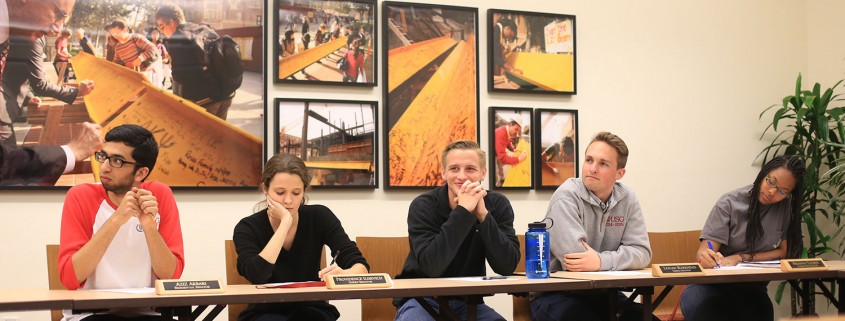Behind the scenes: How USG works
Though Undergraduate Student Government can seem insular, student leaders utilize the methods at their disposal to create campus change.
One powerful method is the resolution.
“Resolutions basically gauge student interest,” said Samantha Cheng, a USG residential senator. “They’re not really binding but they’re a way for us to show administrators that yes, this is something students want.”
Issues from the student body often arise during various committee meetings, which always have at least one attending senator with the authority to spearhead a resolution effort if it materializes.
“It can be brought up by regular students,” Cheng said. “If they have an issue, they can come to us. The resolutions do have to be sponsored by a senator who normally helps in drafting it.”
Senators and members of the particular advocacy committee then do preliminary research.
“They ask, ‘Has it been done before?’” Cheng said. “Has it been approached by USC students in the past? How is it at other schools? If you do the research behind it to back it up, it’s effective.”
Cheng explained that the keystone of a resolution is evidence from polls surveying students on a particular issue after doing the research behind it.
“We go to the entire student body; we promote it on Facebook and through our website so students can take the surveys and we see how relevant it is to them,” Cheng said. “If they say, ‘Yes, this is something I want to do,’ then we start to come up with the resolution.”
The extension of the drop deadline, for example, was one of two resolutions passed last semester; student support played a crucial role in the effort’s success.
“A resolution basically says we have gone to USC students, we have the statistics, we have the poll which is supposed to be representative of the selected body,” said Aaron Rifkind, USG senior adviser and current residential senatorial candidate. “It’s saying, ‘We have data in support of this idea.’”
From there, USG officers speak with administrators before drafting the resolution.
“Senators don’t pass resolutions if they know they’re not going to be successful,” Rifkind said. “The ones we do pass usually have sway. They carry weight, and to keep it that way we don’t want to start doing silly things the administration doesn’t care about or we know they won’t pass.”
The resolution itself then includes the history of the issue on campus and at other schools of similar size, what change students want, and evidence of why it should be changed. Senators often take advantage of insight from administrators to guide them on policy.
“Most of the time you can try speaking to undergraduate advisers or ask people on campus affairs, they’re really attentive to what you have to say, and they’ll give their opinions,” Cheng said.
A completed resolution is then presented to a 12-member senate one week and voted on in the next. There are three Greek, three commuter and six residential senators.
Cheng said the success of a resolution ultimately depends on which facet of campus affairs it addresses.
“With the drop deadline, for example, it was ultimately up to the administration because it was an administrative issue, so when the resolution passed they were the ones who said, ‘Yes, we’ll implement this,’” she said. “With issues on things like SCampus, though, you can run into legal issues.”
Changing parts of the SCampus, for example, requires going through a legal process in addition to the administrative motions of passing a resolution, as SCampus serves as a contract.
In addition to the extension of the drop deadline, the ongoing renovations of Leavey Library stemmed from a USG resolution that articulated student interest.
“I think USG members are the best ones to make those kinds of changes,” said Sean Thomas, a freshman majoring in biology. “They should have a say in what goes on in the libraries and on campus in general because they know from a student perspective what people like.”
One misconception Rifkind has observed about USG is that students believe it to be more exclusive than it actually is, since resolutions and other work confined within the walls of TCC 205.
“What most students don’t know is that anyone can come to hear the presentations made for resolutions,” Rifkind said. “Committees have to present once a month to senate and I don’t know if students are aware that this happens, or that it’s a venue they could use if they wanted to get something changed.”
One student proposed that USG do more outreach and promotion of what the organization really gets done.
“A town hall-type meeting would be a good idea, or some digital form of it, and then making an effort to talking to student groups on campus more and actually going up to them instead of waiting for them to make a complaint,” said Tyler Matheson, a freshman studying business administration.
Ultimately, the senators and the resolutions they create to improve the school are meant to be representative of the needs of the student body.
“The senators are here to represent the students on campus,” Rifkind said. “The only elected positions on USG are senators, the president and vice president, so the senators do their best to voice the student support.”

